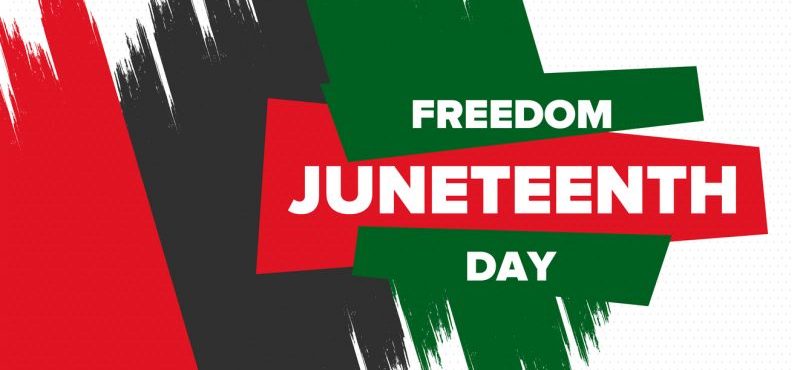“What is Juneteenth, and how is it celebrated?” weren’t common questions posed in national headlines or even in most schools and workplaces a few years ago.
The 156-year-old commemoration, observed on June 19, marks the day in 1865 when all enslaved people in the United States were finally notified of their freedom, more than two years after the Emancipation Proclamation was signed. This pivotal time in our nation’s history took on new meaning last spring in the wake of George Flloyd’s murder, as millions of people across the world publicly rejected racism and the killing of Black people at the hands of law enforcement.
If you’re a state government employee in Texas, New York, Virginia or Washington, where Juneteenth is an official paid holiday, perhaps you’re well aware of the significance. Calls to make Juneteenth a federal holiday gained much-awaited traction this week when the Senate unanimously passed a bill Tuesday marking it as such. [Update: On Wednesday, June 16, the House passed legislation to recognize Juneteenth as a federal holiday. President Biden signed the bill Thursday, June 17.]
Today @POTUS will sign the Juneteenth National Independence Day Act, establishing June 19th as a federal holiday. As the 19th falls on a Saturday, most federal employees will observe the holiday tomorrow, June 18th.
— U.S. Office of Personnel Management (@USOPM) June 17, 2021
Happening Now: President Biden signs the Juneteenth National Independence Day Act into law. https://t.co/5N5o66wTkG
— The White House (@WhiteHouse) June 17, 2021
Currently, 48 states and the District of Columbia have passed legislation recognizing Juneteenth as a holiday or observance, according to the Congressional Research Service. Hawaii’s 31st legislature passed a bill in April 2021 to observe Juneteenth. But as of June 16, the governor hasn’t signed the bill into law. South Dakota does not observe Juneteenth.
“Today is a significant moment in American history,” Democratic Sen. Cory Booker of New Jersey said in a statement following the Senate’s decision to make Juneteenth a federal holiday. “Although our nation still has a long way to go to reckon with and overcome the dark legacy of slavery, the passage of the Juneteenth National Independence Day Act represents a meaningful step forward in the journey of healing America is still reckoning with.”
Republican Sen. John Cornyn of Texas echoed similar sentiments: “The passage of this bill represents a big step in our nation’s journey toward equality. I thank my colleagues in the Senate for their support, and my fellow Texans who have been celebrating this important holiday for more than a century.”
Whether you’ve always recognized and celebrated Juneteenth, or you want to educate yourself and try something different this year, here are some helpful ways you can honor this day.
1. Learn
Did you know that Juneteenth is the oldest nationally celebrated commemoration of the ending of slavery in the United States? There is a wealth of resources available about the significance and history of Juneteenth, and we’re seeing an increase in awareness nationwide.
The Congressional Research Service, the nonpartisan research and analysis arm of Congress, created a fact sheet with background information about Juneteenth and a roundup of additional resources from the Library of Congress, National Archives and Records Administration and other organizations.
2. Celebrate
If you haven’t already, check out what activities are taking place in your community. Local libraries, museums, cities and counties across the country provide reading lists and are hosting hybrid, in-person and virtual events and activities for adults and children to honor the day.
“Today Juneteenth commemorates African American freedom and emphasizes education and achievement. It is a day, a week, and in some areas a month marked with celebrations, guest speakers, picnics and family gatherings. It is a time for reflection and rejoicing. It is a time for assessment, self-improvement and for planning the future.” — Juneteenth.com
Don’t have plans yet? The National Museum of African American History and Culture is hosting a Juneteenth celebration of resilience that you can watch virtually. Tune in here Saturday, June 19, from 10-11 am EDT, or register and catch the pre-recorded event on demand now. In addition to history tidbits, you can also find recipes and suggested activities.
3. Listen
Juneteenth embodies so much that the essence of what it commemorates goes beyond a single day. Consider what your agency or organization can do to honor Juneteenth and what true freedom embodies. Build on those efforts within your workforce and community.
For example, some organizations are matching donations to social justice and civil rights organizations or partnering with nonprofits to host service events and volunteer opportunities. Others are using this time of remembrance as an opportunity to expand and develop diversity, equity and inclusion initiatives.
The Society for Human Resource Management has a roundup of different ways that government entities and organizations are honoring Juneteenth. In King County, Washington, for example, the Black African Women’s Affinity Group hosted a series of events and speakers for all King County employees leading up to Juneteenth.
“In cities across the country, people of all races, nationalities and religions are joining hands to truthfully acknowledge a period in our history that shaped and continues to influence our society today. Sensitized to the conditions and experiences of others, only then can we make significant and lasting improvements in our society.” — Juneteenth.com
How are you celebrating Juneteenth? How about your colleagues? Share how you’re commemorating this day in the comments section below.





What a great article! It is interesting that Juneteenth has existed for over a century, but has only received mainstream attention within the past year.